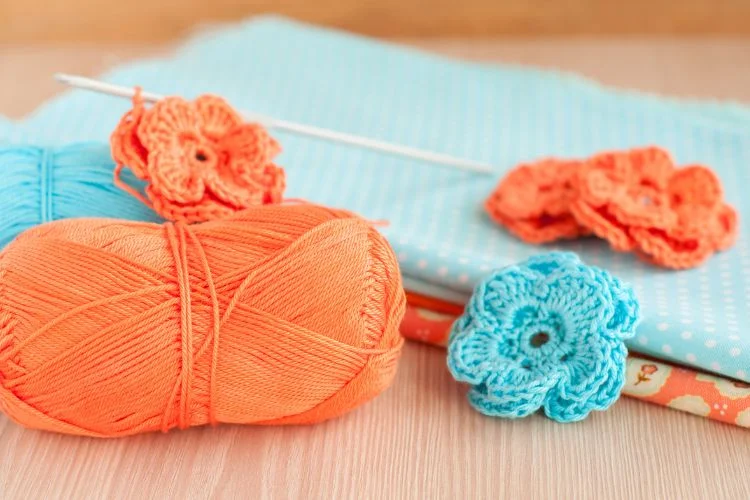In this article:
Delving into the mesmerizing realm of crochet crafts, one quickly realizes that the choice of yarn can dramatically influence the final product. When it comes to choosing cotton yarn for crochet, multiple considerations ensure your projects shine with perfection. Whether you’re crafting a summer top, a cozy blanket, or a bespoke gift, cotton yarn brings a unique blend of versatility, comfort, and aesthetic appeal.
Understanding Cotton Yarn Properties
- Natural Fiber
Cotton is a natural fiber, derived from the cotton plant. Being natural, it offers benefits like:
- Breathability: Allows for air circulation, making it ideal for warmer climates.
- Hypoallergenic: Less likely to cause allergic reactions.
- Absorbency
Cotton has excellent moisture-wicking properties. This characteristic makes it a top choice for:
- Dishcloths: As it can effectively absorb water.
- Summer Garments: Because it can wick away sweat, keeping the wearer cool.
- Durability
Cotton is known for its strength. It doesn’t pill easily and maintains its structure over time.
Types of Cotton Yarns
- Mercerized Cotton
- Characteristics: Treated to increase its luster and strength. The process also makes it more dye-absorbent.
- Best For: Projects requiring a shiny finish, like decorative items or luxurious garments.
- Combed Cotton
- Characteristics: Has been combed to remove impurities, resulting in a softer and stronger yarn.
- Best For: Clothing items, especially for babies or sensitive skin.
- Organic Cotton
- Characteristics: Grown without pesticides or chemical fertilizers.
- Best For: Those who prioritize eco-friendliness and natural products.
Factors to Consider When Choosing Cotton Yarn for Crochet
- Project Type
Your intended project plays a pivotal role in yarn selection. For instance:
- Dishcloths or Towels: Regular cotton yarn with its absorbency would be ideal.
- Fashion Items: Mercerized cotton might be your best bet for that added sheen.
- Texture & Feel
Always feel the yarn before buying. It should be soft to the touch, especially if it’s meant for wearable items.
- Color Fastness
For projects that might need frequent washing, ensure the yarn color doesn’t fade easily. Some high-quality cotton yarns come with color-fastness guarantees.
- Yarn Weight
Just like other yarn types, cotton yarn comes in various weights:
- Lightweight: Suitable for lacy designs and delicate items.
- Medium Weight: Perfect for general purposes like blankets or clothing.
- Bulky: Best for projects where you want a chunky look.
- Budget
Cotton yarn prices can vary widely based on their type and brand. Set a budget, but don’t compromise too much on quality, especially for long-term or special projects.
Tips for Working with Cotton Yarn
- Washing: Cotton can shrink. Always pre-wash before starting your project or recommend a gentle cold wash to the end-user.
- Stretch: Cotton tends to stretch and might not always spring back. It’s essential to keep this in mind when working on fitted garments.
- Needle/Hook Size: Ensure you’re using the recommended needle or hook size for your chosen yarn weight. This ensures the right tension and drape.
Cotton Yarn Blends: A Unique Fusion
While pure cotton yarn boasts several admirable qualities, sometimes, blends can offer an optimal balance of characteristics. Here’s a dive into some popular cotton yarn blends and their unique features:
- Cotton-Linen Blend
- Characteristics: Linen adds a rustic touch to the yarn while enhancing its breathability and strength.
- Best For: Summer garments, shawls, and lightweight blankets.
- Cotton-Bamboo Blend
- Characteristics: Bamboo infuses the yarn with additional softness, sheen, and anti-microbial properties.
- Best For: Delicate wearables, baby clothes, and items that require a gentle touch.
- Cotton-Acrylic Blend
- Characteristics: Acrylic enhances the yarn’s durability and lightness, making it more resistant to wear and tear.
- Best For: Everyday items, toys, and pieces that require frequent washing.
Environmental Considerations
Cotton yarn, especially when organically produced, is generally considered environmentally friendly. However, it’s worth noting:
- Water Consumption: Traditional cotton farming can be water-intensive. If sustainability is a priority, look for brands practicing water-efficient farming.
- Pesticides and Chemicals: Organic cotton avoids harmful pesticides, making it a eco-friendlier option.
Storing Your Cotton Yarn
Like all yarns, cotton requires some care in storage:
- Keep Dry: Ensure your storage area is free from moisture to prevent mold.
- Avoid Direct Sunlight: Sun can fade the colors of your yarn.
- Organize by Weight or Color: This makes it easier to locate the perfect yarn for your next project without unnecessary unraveling or tangling.
Begin Your Cotton Yarn Crochet Projects with Confidence
The right choice of cotton yarn for crochet can elevate your project from good to outstanding. It offers an unmatched blend of comfort, versatility, and aesthetic appeal suitable for various projects. As you journey through the crocheting world, experiment with different cotton yarn types and qualities to discover your personal favorite. And for those looking to venture into new creative domains, numerous free crochet patterns are available online, many specifically tailored for cotton yarn. Happy crafting, and may your stitches always hold the promise of perfection!




